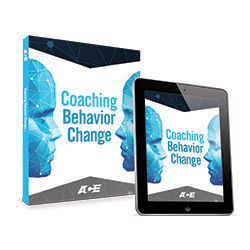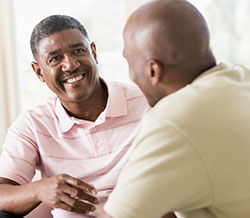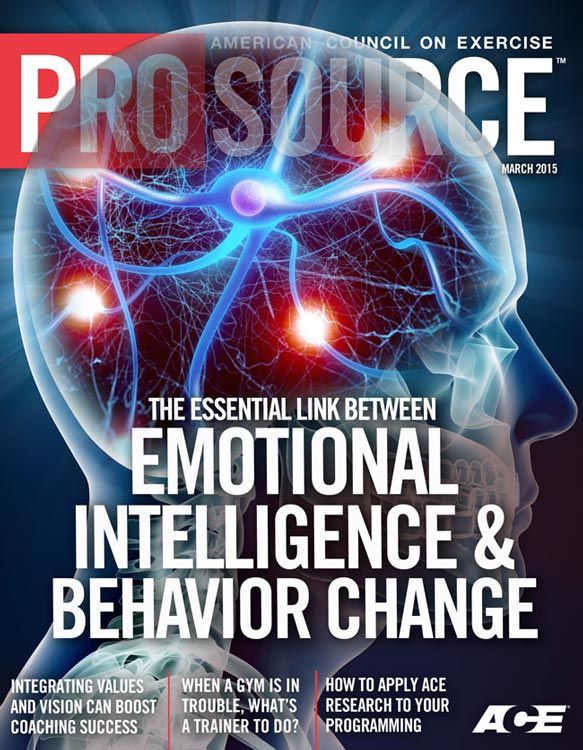
I was trained as a clinical psychologist, so I’ve always been interested in behavior change. When I became a science journalist at The New York Times, I started tracking what was then a very new surge in findings on the brain and emotions. Why would we lose it emotionally and what we could do about it—how we could manage our emotions better.

Develop Skills to Drive Change as an ACE Behavior Change Specialist
No matter how you work with clients and patients, effective coaching can further heighten the impact of your program. As an ACE Behavior Change Specialist, you’ll learn to develop the practical, hands-on skills you need to lead people to long-term, healthy change in one-on-one, group and virtual settings. And you’ll learn from the best. Our interactive learning experience features science-based, time-tested expertise from pioneers in psychology, emotional intelligence, motivational interviewing and coaching.
Take Your Expertise Further.
Learn more at acefitness.org
I was reading a very obscure journal—so obscure it doesn’t exist anymore—that had an article called “Emotional Intelligence.” This was in 1990—it was the first time I’d ever heard the phrase, the first time it was used in print. And I thought: That is an electrifying phrase, because first of all, you don’t expect emotions and intelligence to go together. But second, it suggests we can be intelligent about emotions, we can get better at managing our emotions. This, of course, is the behavior-change piece.
I used the concept of emotional intelligence as the framework for the book I did by that name, which was just not about the concept, but also about brain research, about the emotional centers in the brain in the prefrontal areas, the executive centers that manage them for us, and how we can get better at doing that.
The Four Attributes of Emotional Intelligence
The first attribute is self-awareness, knowing what you’re feeling and why. It also goes to another level—knowing what your strengths are, knowing what you could get better at. For behavior change, that’s an absolutely crucial piece. Knowing what you can build on, knowing what your limits are and where you really need to work—that’s crucial, but that takes a realistic self-assessment.
The second attribute is self-management, and using self-awareness to get better at handling your impulses, your disruptive emotions. Focusing on your goals and keeping working toward those goals even when things get tough. Particularly for fitness, that’s a very big piece.
A third element of emotional intelligence is empathy, sensing how other people feel and reading them accurately, and that helps you with the fourth piece, which is skillful relationships. In coaching and in helping people get better at fitness, it’s all about the relationship and how well you can communicate with people, how well you can inspire them, how well you can listen and how well you can motivate.
It’s helpful to keep in mind that there are three kinds of empathy. One is cognitive empathy, which means you understand how a person thinks about the situation, you understand their mental models. This helps you as a trainer or as a coach be really excellent as a communicator, because you can put things in terms that really resonate with your client, that he or she really understands.

The second kind of empathy is really crucial, too. This is emotional empathy. Feeling with the other person exactly what they’re feeling. This helps you stay on target. It can help you sense when maybe they’re getting upset with you, or maybe they’re feeling frustrated and down on themselves, whatever it may be. You want to pick that up in the moment so that you can handle that feeling and turn it around so that you can work it to your advantage.
The third kind of empathy is called empathic concern. It means that no matter what’s going on with the client and his or her thoughts and feelings, you also understand what it is that person needs in the moment and what you can do to help. Your motivation is set so that you’re there for the client—you want to help him or her. That keeps you helping in an effective way right through the entire session, because you have the client’s well-being as your main interest. Every part of emotional intelligence can be strengthened and increased with the right kind of training.
The Importance of Attention
Attention is essential. Very few people realize this, but it’s a mental ability that can be strengthened with practice. The more concentrated we are, the more fully attentive to the moment we are, the more mindful we are of what’s going on and the better we do whatever it is we want to do.
There’s data showing, for example, that concentration levels of athletes predict very well with their performance in the following season. As every trainer knows, if a client’s mind is wandering, if he or she is distracted, the client just won’t get the maximum benefit from the exercise program you’ve designed. You want to be fully present, and you want your client to be fully present.
Attention is the essence and the foundation of what you’re doing in a coaching session. Attention is a muscle, a mental muscle. The basic move in the mental gym is this: You concentrate on being fully present. Your mind is going to wander. Minds wander—that’s the way we're wired. The trick is to be mindful of the fact that, "Oh my mind has wandered," and to bring it back to that original point of focus. Every time you do that, the neurocircuitry for concentrating gets that much stronger. It's exactly parallel to working out in the gym, but the gym here is the mind.
Mind wandering, although it's very powerful in bringing people out of the moment, is actually very feeble. That’s because a simple reminder like, “Let’s focus,” is going to make it vanish and bring a person back. The key, actually, is your mindfulness in noticing that the client has drifted away, and helping them realize that and bring themselves back.
Attention and Focus
There are three kinds of attention that matter very much. One is full concentration—that’s being absolutely present to the client. The second is daydreaming. It's not just the client who daydreams—you can be daydreaming, too. If you’re daydreaming, you’re just not present. You have to remind yourself to come back into focus.
The third kind of attention is what happens when you’re emotionally upset about something. The worst, most powerful kind of distractor is upsetting emotions. It’s often things in your relationships that aren’t working well that just keep coming back to you. When it does, it hijacks your attention.
It makes you think, “Gee, what could I have done? Should I have said that? What can I say next time I see her or him?” In other words, you start obsessing about something that’s not in the here and now. It takes a powerful reminder to bring yourself back: “Oh, I'm with a client. I’ve got to focus in the present.”

We’ve just started to realize that attention is integral to outstanding performance and excellence. The same is actually true in the gym. Everybody knows that at the Olympic level, it becomes a mental game. It becomes how well you can concentrate without getting agitated. You know that calm, clear focus is what you see in people who are world class in any sport.
You take that to your work with clients and one of the things you want to help them develop is their own focus. Because that will help them be better. It’s not just your focus—what you’re training, implicitly or explicitly, is the person's ability to concentrate on what they’re practicing, on what you’re telling them to do.
The good news is there are easy methods that you can use to help you and your clients become better at concentrating. This can be part of your workout. You can start with some easy attention training—tell your client it’s time to get focused, because every time you bring that wandering attention back, you’re strengthening the circuit. If you start a session with, “Okay, let’s do two, three, four, five minutes of this together,” you're going to have a much better session. Over time, you’re going to help that person be able to focus much better on his or her own.
It is essential that you go through those steps of focusing on one thing. When your mind wanders, you become aware of it, and you bring it back. You do it over and over again. It's really not much different from working out in a gym, and building your muscle. But what you're doing is building the mental ability to catch yourself in the moment.
No matter what it is you're doing—trying to help people lose weight or improve their fitness—if your clients don’t have the full power of their attention, you’re not going to be as effective in your work with them. Helping your clients enhance their ability to focus will help you be a better coach and help them achieve their goals.
Applying Behavioral Science to Weight Loss
Fitness training and, in particular, health coaching is applied behavioral science. There are two points from behavioral science that I think are very important for weight loss.
First is the way motivation works—you want to keep people positively focused. You want to praise them for any steps they’ve taken, but also help them visualize and really feel what it will be like to attain their goals, whatever those goals may be. This actually activates a positive circuitry in the brain that keeps people heading toward their goals no matter how frustrated they get or whatever obstacles come up.
The second point is mindfulness. Mindfulness means being aware of what your triggers are—what it is that makes you reach for that fattening food and forget the diet—and becoming mindful of what is happening.
For example, say I'm feeling a little depressed about a relationship and I'm reaching for the ice cream. The minute you can tell yourself that, you change your relationship to the influence that has you reaching. Instead of being trapped and carried away by it, you're looking at it. The more you can see it as something that you can talk to yourself about, you can remind yourself, “Well, I don’t really want to be doing this.” This gives you more power to change where you end up.

The Marshmallow Experiment
Walter Michelle did a legendary experiment at Stanford University called the Marshmallow test. He brought 4-year-old children from the Stanford preschool in to his lab. One by one, he sat them down at a small table, put a big juicy marshmallow in front of them and said, "You can have this marshmallow now if you want. If you don't eat it now, if you wait until I run an errand and come back, you can have two marshmallows then." Then, he leaves. This is the predicament that tries the soul of any 4-year-old child. What are they going to do? Eat the marshmallow or wait? Some of them go off and sing and dance to distract themselves. About a third gobble it down immediately. A third wait out the eight or nine minutes and get two marshmallows. They tracked the participants down 14 years later and they found that this ability to delay gratification stayed and that kids who were able to resist the marshmallow were doing much better in school. They did much better in their lives and many studies now have shown that the ability to resist impulse and stay focused on what you’re doing can help predict how well people do in life.
Let me give you a little bit of background from cognitive science because what's going on here has to do with the difference between a bottom-up response and a top-down response. Bottom-up responses are implicit. We don't think about them. They're automatic and spontaneous. It's ordering the dessert without thinking twice. It's reaching for the butter and the bread. It's doing all those things that are going to add on weight, but doing it unconsciously. What you're trying to do as a coach is bring all of those behaviors into consciousness. This requires mindfulness.
Top-down awareness is when you're fully aware of what's going on. So, you can see, for example, that your friend is ordering dessert and that your automatic response now would be to join them. That's the social factor. However, if you can bring that into awareness and say, "Oh, this is one of those danger moments. I'm not going to do it," then you're able to resist. If you start to see yourself reach for the butter and realize, "Well, I'm doing it again," you have a choice point that you actually did not have before.
So, I think that one of the elements of health coaching for clients who want to lose weight has to be helping them develop their potential power. In this way, they can be more mindfully present to what's going on because that gives them the choice that they actually didn't have before.
Cognitive control, which means not giving into impulse, is the essential ability in weight loss. It's the essential ability in sticking with any training regimen. It means you're going to keep going even though it may be tough. You're not going to let that impulse take you over.
The more aware you are of the impulse and the more aware you are that you have a choice, the better you'll be at applying your conscious, focused attention and saying, "No, I'm not going to do it." Because, you know that you're working toward a goal. You have something better in mind. That kind of self-control is part of the essence of both physical fitness and health.





 by
by 






